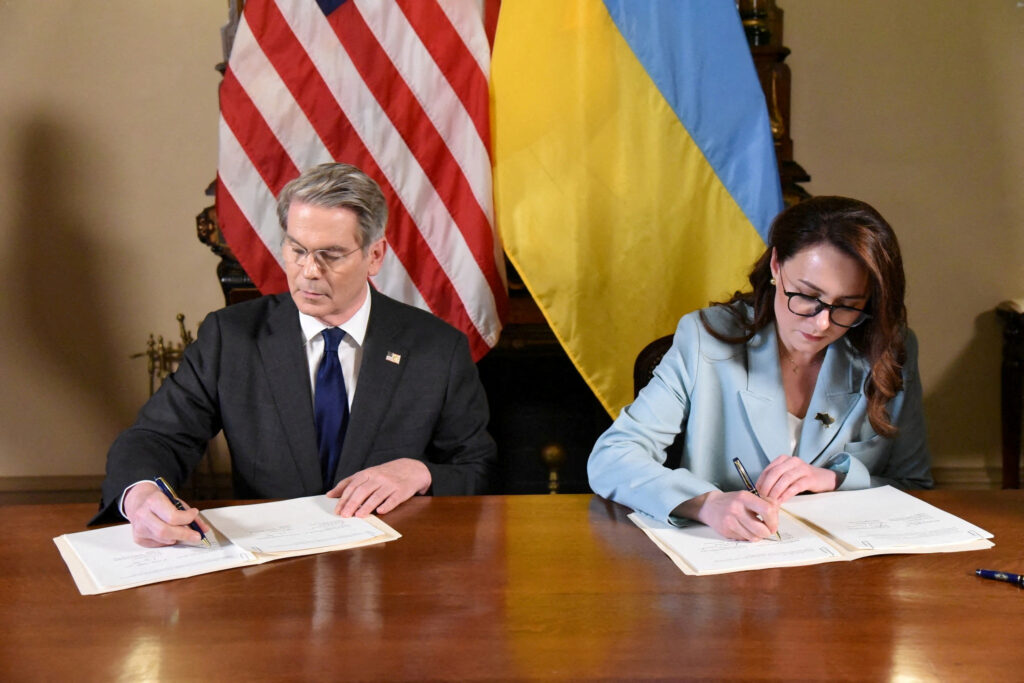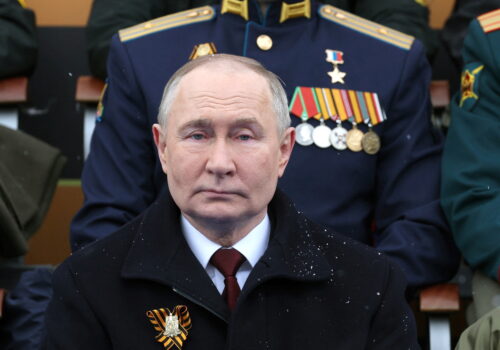There was a sense of cautious optimism in Kyiv on Thursday morning as Ukrainians reacted to news that a long-awaited natural resources agreement with the United States had finally been signed. While the details of the minerals deal are still being digested, many have already noted that the key terms of the agreement are now far more favorable for Ukraine than earlier drafts, which some Ukrainian critics had likened to “colonial” exploitation.
Ukrainian President Volodymyr Zelenskyy first raised the prospect of a minerals-sharing agreement between Ukraine and the United States in late 2024 as he sought to engage with Donald Trump in the run-up to America’s presidential vote. The idea gained further momentum following Trump’s election victory, but a planned signing ceremony was abandoned in late February following a disastrous Oval Office meeting between Trump and Zelenskyy.
When talks resumed in early spring, leaked details indicated a hardening of the American position, with US officials insisting on extensive control over Ukrainian assets and seeking to use revenues to repay aid provided to Ukraine during the first three years of Russia’s full-scale invasion. However, following weeks of exhaustive negotiations, the most contentious conditions have now been removed, resulting in a more forward-looking document that sets the stage for a potential deepening in the strategic partnership between Kyiv and Washington.
Stay updated
As the world watches the Russian invasion of Ukraine unfold, UkraineAlert delivers the best Atlantic Council expert insight and analysis on Ukraine twice a week directly to your inbox.
Ukraine’s Minister of Economy Yulia Svyrydenko, who traveled to the US to sign the minerals deal on Wednesday evening following intense last-minute discussions over the fine print of the agreement, emphasized that Ukraine would retain ownership and control over its natural resources. She noted that the final wording “provides mutually beneficial conditions” for both countries, and praised the deal as “an agreement that reaffirms the United States commitment to Ukraine’s security, recovery, and reconstruction.”
Back in Kyiv, many saw the signing primarily as an opportunity to improve relations with the Trump White House following a turbulent few months that has seen the US President employ harsh rhetoric toward Ukraine while repeatedly blaming the country for Russia’s invasion. “Ukraine held the line. Despite enormous pressure, every overreaching demand from the other side was dropped. The final deal looks fair,” commented Kyiv School of Economics president Tymofiy Mylovanov. “It’s a major political and diplomatic win for Ukraine and the US that gives Trump a domestic political boost. That will translate, I expect, into a more positive attitude toward Ukraine.”
There was also much praise for the Ukrainian negotiating team and their ability to accommodate US interests while addressing Kyiv’s concerns. “This final version is significantly fairer and more mutually beneficial than earlier drafts,” stated Olena Tregub, who serves as executive director of Ukraine’s Independent Anti-Corruption Commission (NAKO). “To me, the minerals agreement is a clear win-win. It’s a well-negotiated, balanced deal that reflects both strategic vision and professionalism.”
Eurasia Center events

Many members of the Ukrainian parliament adopted a pragmatic view of the landmark minerals deal. “It seems like Trump was putting pressure on us in an attempt to get a victory during his first hundred days in office,” commented Oleksandr Merezhko, a lawmaker representing President Zelenskyy’s Servant of the People party who chairs the Ukrainian parliament’s foreign affairs committee. “The devil is in the details. But politically there are upsides. We have improved relations with Trump, for whom the deal is a win.”
Fellow Ukrainian member of parliament Inna Sovsun, who represents the opposition Golos party, underlined the unprecedented challenges Ukraine faced during negotiations as the country sought to broker a fair deal with a crucial ally while fighting for national survival. “We weren’t choosing between good and bad, we were choosing between bad and worse. What we got is better than the initial offer,” she noted.
While the general mood in Kyiv was relatively upbeat following the news from Washington, Sovsun stressed that the new natural resources agreement with the United States falls far short of the security guarantees that Ukraine is seeking in order to safeguard the country’s future and prevent further Russian aggression. “A true end to the war can only happen if the US provides significantly more weapons to Ukraine, is willing to apply greater sanctions pressure on Russia, or ideally both. If neither happens, it’s hard to expect the war to end.”
Peter Dickinson is editor of the Atlantic Council’s UkraineAlert service.
Further reading
The views expressed in UkraineAlert are solely those of the authors and do not necessarily reflect the views of the Atlantic Council, its staff, or its supporters.

The Eurasia Center’s mission is to enhance transatlantic cooperation in promoting stability, democratic values, and prosperity in Eurasia, from Eastern Europe and Turkey in the West to the Caucasus, Russia, and Central Asia in the East.
Follow us on social media
and support our work
Image: US Treasury Secretary Scott Bessent and Ukrainian First Deputy Prime Minister Yulia Svyrydenko sign a deal that will give the United States preferential access to new Ukrainian minerals deals and fund investment in Ukraine's reconstruction, in Washington, D.C., U.S., April 30, 2025, in this picture obtained from social media. (Yulia Svyrydenko via Facebook/via REUTERS)




